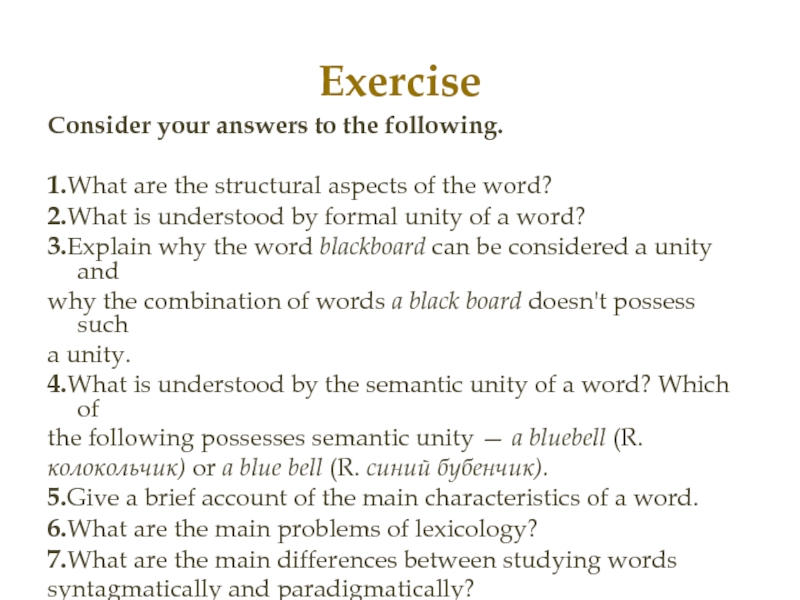Lexicology
is a branch of linguistics, which
deals with the vocabulary of a language and the properties of words
as the main units of language. The term lexicology is composed of two
Greek morphemes ‘lexis’ – word, phrase and ‘logos’ –
learning, i.e. the science of the word. However the literal meaning
gives only the general motion of the aims and the subject matter of
this brunch of linguistics, since all the other brunches also study
words in one way or another. Ex: phonetics is connected with the
study of the outer sound-form of the word. Grammar – with the study
of the grammatical structure of language. Lexicology as a branch of
linguistics has its own aims and methods of scientific research. Its
basic task is a study and systematic description of vocabulary, in
respect to its origin, development and current use. Lexicology is
concerned with words, variable word-groups, phraseological units and
morphemes which make up words. The general study of words and
vocabulary irrespective of the specific features of any particular
language is known as general lexicology. Special lexicology is the
lexicology of a particular language. Within lexicology we distinguish
various brunches: semaseology studies
meaning; phraseology studies
word groups functionally and semantically inseparable, i.e.
phraseological units; word-formation –
the study of various types and ways of forming words; etymology –
the study of the origin and history of words, causes of their
appearance, their volume; lexicography is
considered by some linguists to be a separate branch of linguistics,
connected with lexicology. Still others think it to be a brunch of
lexicology. Lexicography is a science of dictionary compiling. It
deals with the same problems as lexicology – the form, meaning,
usage and origin of vocabulary units.
2. What is a word
We
do know that the word is a unit of speech which, as such, serves the
purposes of human communication. Thus, the word can be defined as a
unit
of communication.
Secondly,
the
word can be perceived as the total of the sounds which comprise it.
Third,
the
word, viewed structurally, possesses several characteristics.
The
modern approach to word studies is based on distinguishing between
the external and the internal structures of the word.
1
By the vocabulary
of
a language is understood the total sum of its words. Another term for
the same is the stock
of words
The
word
is
a speech unit used for the purposes of human communication,
materially representing a group of sounds, possessing a meaning,
susceptible to grammatical employment and characterised by formal and
semantic unity.
The
external structure of words, and also typical word-formation
patterns, are studied in the section on word-building (see Ch. 5, 6).
The
internal structure of the word, or its meaning,
is
nowadays commonly referred to as the word’s semantic
structure. This
is certainly the word’s main aspect. Words can serve the purposes of
human communication solely due to their meanings, and it is most
unfortunate when this fact is ignored by some contemporary scholars
who, in their obsession with the fetish of structure tend to condemn
as irrelevant anything that eludes mathematical analysis. And this is
exactly what meaning, with its subtle variations and shifts, is apt
to do.
The
area of lexicology specialising in the semantic studies of the word
is called semantics.
Another
structural aspect of the word is its unity. The word possesses both
external (or formal) unity and semantic unity. Formal unity of the
word is sometimes inaccurately interpreted as indivisibility. The
example of post-impressionists
has
already shown that the word is not, strictly speaking, indivisible.
Yet, its component morphemes are permanently linked together in
opposition to word-groups, both free and with fixed contexts, whose
components possess a certain structural freedom, e. g. bright
light, to take for granted.
3
Informal Style
Informal
vocabulary is used in one’s immediate circle: family, relatives or
friends. One uses informal words when at home or when feeling at
home.
Informal
style is relaxed, free-and-easy, familiar and unpretentious. But it
should be pointed out that the informal talk of well-educated people
considerably differs from that of the illiterate or the
semi-educated; the choice of words with adults is different from the
vocabulary of teenagers; people living in the provinces use certain
regional words and expressions. Consequently, the choice of words is
determined in each particular case not only by an informal (or
formal) situation, but also by the speaker’s educational and cultural
background, age group, and his occupational and regional
characteristics.
Informal
words and word-groups are traditionally divided into three types:
colloquial,
slang and
dialect
words and word-groups.
4
Colloquial Words
Among
other informal words, colloquialisms
are
the least exclusive: they are used by everybody, and their sphere of
communication is comparatively wide, at least of literary
colloquial words. These
are informal words that are used in everyday conversational speech
both by cultivated and uneducated people of all age groups. The
sphere of communication of literary colloquial words also includes
the printed page, which shows that the term «colloquial» is
somewhat inaccurate.
Vast
use of informal words is one of the prominent features of 20th
century English and American literature. It is quite natural that
informal
words appear in dialogues in which they realistically reflect the
speech of modern people.
Here
are some more examples of literary colloquial words. Pal
and
chum
are
colloquial equivalents of friend;
girl, when
used colloquially, denotes a woman of any age; bite
and
snack
stand
for meal;
hi, hello are
informal greetings, and so long
a
form of parting; start,
go on, finish and
be
through are
also literary colloquialisms; to
have a crush on somebody is
a colloquial equivalent of to
be in love. A bit (of) and
a
lot (of) also
belong to this group.
Literary
colloquial words should not only be included in the students’
functional and recognition vocabularies, but also presented and
drilled in suitable contexts and situations, mainly in dialogues. It
is important that students should be trained to associate these words
with informal, relaxed situations.
5
The informal element in the vocabulary. Slang.
Slang words are expressive mostly ironical words serving to create
fresh names for some things that are frequent topics of discourse.
The etimology of word “slang” had not been established so far. In
different dictionaries different words are refered to the layer of
slang. Slang is substantive colloquial speech of general currency
which is emotionally coloured and synonyms to neutral words. there
are various slang words for money:
beans, brass, dough, poof. The slang synonym for the word head—
attic, brain-pan, hat peg, nut, upper storey. Slang exist on 2
levels:1) highly colloquial words(general slang): buck, bob, to tuck
in; 2)words of different jargons [‘ʤɑːgən](medical, students,
theatrical)- special slang:big boy-крупнокалиберная пушка,
to cut a lesson-сбежать c
yрока.
There are cases when words originating as professional slang later on
become terms. A great deal of slang come from the USA:cute, teenager,
snob, trip, hitch-hiker.
Соседние файлы в предмете [НЕСОРТИРОВАННОЕ]
- #
- #
- #
- #
- #
- #
- #
- #
- #
- #
- #
Lexicology is a science that focuses onin the vocabulary of a particular language. It has its own laws and categories. What does lexicology study? This science deals with various aspects of words, as well as their functions and development.
The concept of
Lexicology is a science that studies the vocabulary of a language and its features. The subject of this section of linguistics is the following:
- Functions of lexical units.
- The problem of the word as the basic constituent of the language.
- Types and types of lexical units.
- The structure of the vocabulary of the language.
This is not yet a complete list of what is being studiedlexicology. This science deals with issues of replenishment and expansion of vocabulary, and also considers the links and contradictions between lexical units.
Object of study
The word and its meaning are the basis for many sciences. Morphology deals with these questions, as well as various directions of word formation. However, if in these sciences words are a means of studying grammatical structures or studying various models for different variants of word formation, then what is learned by lexicology is used directly for understanding the specifics of the words themselves. Lexical units are viewed not simply as a collection of letters and sounds, but are an integral system that has its connections, functions, categories and concepts. This is the object of the study of lexicology. She does not consider individual words, but the whole vocabulary as something whole and inseparable.
This approach has its own peculiarities. This allows us to refer to the category of lexical units not only words, but also stable word combinations that have a certain analytical role.
Word problem
Lexicology of the modern Russian languagefocuses on the object and subject of its study. Since the word is regarded as a unit that has connections between its form and content, it is considered in three main aspects:
- Structural. The form of the word, its structure and components are studied.
- Semantic. The meaning of lexical units is considered.
- Functional. The role of words in speech and in the general structure of language is investigated.
If we talk about the first aspect, then lexicology -is a science that establishes specific criteria for determining the difference and identity of individual words. To do this, lexical units are matched with word combinations, and an analytical structure is developed that allows you to establish word invariants.
As for the semantic aspect, thisis engaged in a separate science — semasiology. She studies the relationship between a word and a certain object. This is important for lexicology. She studies the word and its meaning, as well as its separate categories and types, which makes it possible to identify concepts such as monosemy (uniqueness) and polysimy (polysemy). Lexicology also studies the causes that lead to the appearance or loss of a word of its meaning.
Functional aspect considers lexicalunit as an object that communicates with other similar elements and builds a whole system of language. The role of the interaction of vocabulary and grammar is important here, which, on the one hand, support, and on the other — limit each other.
Definition of vocabulary
Lexicology regards words as a system,which consists of several subsystems. Lexical units form groups that are different in volume, form and content. This is part of what is learned by lexicology. At the same time, the vocabulary is explored in two aspects: as a group relationship between individual units and their proper location in relation to each other. Thanks to this vocabulary can be divided into separate categories. For example, homonyms, paronyms, synonyms, antonyms, hyponyms, etc.
In addition, almost any sectionlinguistics, including Russian or English lexicology, is studying more voluminous groupings of words, which are called fields. Usually it is built on the basis of the field core, for example, a certain number of keywords, and the boundaries themselves, which are a variety of paradigmatic, semantic, grammatical or other types of relationships with given lexical units.
Sections of lexicology
Like any other science, lexicology has its own system of disciplines that are responsible for certain aspects of its object and subject of study:
- Semasiology. Engaged in the meaning of words and phrases.
- Onomasiology. He studies the procedure for naming objects and phenomena.
- Etymology. Explores the origin of words.
- Onomastics. Engaged in proper names. This applies to both people’s names and geographical names.
- Stylistics. Studying the meaning of words and expressions of a connotative nature.
- Lexicography. Engaged in ways to organize and compile dictionaries.
- Phraseology. Explores phraseological units and persistent expressions.
Sections of lexicology have their owncategory, as well as the object and subject of study. In addition, there are some types of this science. In particular, we are talking about general, private, historical, comparative and applied lexicology. The first type is responsible for the general patterns of vocabulary, including its structure, stages of development, functions, etc. Private lexicology deals with the study of a specific language. The historical type is responsible for the development of words in connection with the history of names of objects and phenomena. Comparative lexicology examines words in order to identify the relationship between different languages. The latter type is responsible for such processes as the culture of speech, features of translation, linguistic pedagogy and lexicography.
Categories of lexical units
The vocabulary of any language is differentdiversity and heterogeneity. Accordingly, distinguish categories that have their own distinctive features and characteristics. Russian lexicology foresees the following subspecies:
- In the field of application: common words and lexical units that are used in special situations (science, poetry, old talk, dialects, etc.).
- On the emotional load: neutral and emotionally colored units.
- On historical development: neologisms and archaisms.
- By its origin and development: internationalism, borrowing, etc.
- By functionality — active and passive lexical units, as well as occasionalisms.
Given the continuous development of the language, the boundaries between words are fuzzy, and they can move from one group to another.
Problems
Like any other science, lexicology deals with certain problems. Modern specialists distinguish the following:
- Frequency of words in the text.
- The difference between lexical units in writing and in oral speech.
- The possibilities of words that allow you to create new names for objects and phenomena.
- Change the meaning of vocabulary.
Science also studies variants of the compatibility of words at different levels: semantic and lexical.
Ways to replenish the vocabulary
Lexicology is exploring optionsnominations. This means different ways and methods of expanding the vocabulary. For this, both the internal resources of a particular language can be used, as well as the use of lexical units from other languages. There are the following ways of replenishing the vocabulary:
- Word formation is the creation of new words.
- Construction of new values for already existing words: polysemy, transfer of values, etc.
- Formation of persistent phrases.
- Borrowing.
These methods are typical for any language, but in each case have their own characteristics and distinctive features.
Methods
For its needs, lexicology uses general linguistic research methods. These include:
- Distribution. Responsible for defining the scope of a lexical unit, for the number of values, etc.
- Substitution. He studies the phenomena of synonymy and variations of words.
- Component method. Responsible for the splitting of lexical units into separate components, and also deals with their general structure.
- Transformation. Used in the process of word formation in order to determine the main component of the word.
- Statistical method. Used to determine the frequency of using lexical units, as well as to calculate their semantic, paradigmatic and other types of links.
The information obtained with the help of these methods is also used in other sciences, including psycholinguistics, neurolinguistics, and a number of social disciplines.
Lexicology is the branch of linguistics that analyzes the lexicon of a specific language. A word is the smallest meaningful unit of a language that can stand on its own, and is made up of small components called morphemes and even smaller elements known as phonemes, or distinguishing sounds. Lexicology examines every feature of a word – including formation, spelling, origin, usage, and definition.[1]
Lexicology also considers the relationships that exist between words. In linguistics, the lexicon of a language is composed of lexemes, which are abstract units of meaning that correspond to a set of related forms of a word. Lexicology looks at how words can be broken down as well as identifies common patterns they follow.[2]
Lexicology is associated with lexicography, which is the practice of compiling dictionaries.[3]
EtymologyEdit
The term lexicology derives from the Greek word λεξικόν lexicon (neuter of λεξικός lexikos, «of or for words»,[4] from λέξις lexis, «speech» or «word»[5]) and -λογία -logia, «the study of» (a suffix derived from λόγος logos, amongst others meaning «learning, reasoning, explanation, subject-matter»).[6]
Etymology as a science is actually a focus of lexicology. Since lexicology studies the meaning of words and their semantic relations, it often explores the history and development of a word. Etymologists analyze related languages using the comparative method, which is a set of techniques that allow linguists to recover the ancestral phonological, morphological, syntactic, etc., components of modern languages by comparing their cognate material.[7] This means many word roots from different branches of the Indo-European language family can be traced back to single words from the Proto-Indo-European language. The English language, for instance, contains more borrowed words (or loan words) in its vocabulary than native words.[8] Examples include parkour from French, karaoke from Japanese, coconut from Portuguese, mango from Hindi, etc. A lot of music terminology, like piano, solo, and opera, is borrowed from Italian. These words can be further classified according to the linguistic element that is borrowed: phonemes, morphemes, and semantics.[7]
ApproachEdit
General lexicology is the broad study of words regardless of a language’s specific properties. It is concerned with linguistic features that are common among all languages, such as phonemes and morphemes. Special lexicology, on the other hand, looks at what a particular language contributes to its vocabulary, such as grammars.[2] Altogether lexicological studies can be approached two ways:
- Diachronic or historical lexicology is devoted to the evolution of words and word-formation over time. It investigates the origins of a word and the ways in which its structure, meaning, and usage have since changed.[9]
- Synchronic or descriptive lexicology examines the words of a language within a certain time frame. This could be a period during the language’s early stages of development, its current state, or any given interval in between.[10]
These complementary perspectives were proposed by Swiss linguist Ferdinand de Saussure.[10] Lexicology can have both comparative and contrastive methodologies. Comparative lexicology searches for similar features that are shared among two or more languages. Contrastive lexicology identifies the linguistic characteristics which distinguish between related and unrelated languages.[9]
SemanticsEdit
The subfield of semantics that pertains especially to lexicological work is called lexical semantics. In brief, lexical semantics contemplates the significance of words and their meanings through several lenses, including synonymy, antonymy, hyponymy, and polysemy, among others. Semantic analysis of lexical material may involve both the contextualization of the word(s) and syntactic ambiguity. Semasiology and onomasiology are relevant linguistic disciplines associated with lexical semantics.[9]
A word can have two kinds of meaning: grammatical and lexical. Grammatical meaning refers to a word’s function in a language, such as tense or plurality, which can be deduced from affixes. Lexical meaning is not limited to a single form of a word, but rather what the word denotes as a base word. For example, the verb to walk can become walks, walked, and walking – each word has a different grammatical meaning, but the same lexical meaning («to move one’s feet at a regular pace»).[11]
PhraseologyEdit
Another focus of lexicology is phraseology, which studies multi-word expressions, or idioms, like ‘raining cats and dogs.’ The meaning of the phrase as a whole has a different meaning than each word does on its own and is often unpredictable when considering its components individually. Phraseology examines how and why such meanings exist, and analyzes the laws that govern these word combinations.[12]
Idioms and other phraseological units can be classified according to content and/ or meaning. They are difficult to translate word-for-word from one language to another.[13]
LexicographyEdit
Lexicography is the study of lexicons, and is divided into two separate academic disciplines. It is the art of compiling dictionaries.[14]
- Practical lexicography is the art or craft of compiling, writing and editing dictionaries.
- Theoretical lexicography is the scholarly study of semantic, orthographic, syntagmatic and paradigmatic features of lexemes of the lexicon (vocabulary) of a language, developing theories of dictionary components and structures linking the data in dictionaries, the needs for information by users in specific types of situations, and how users may best access the data incorporated in printed and electronic dictionaries. This is sometimes referred to as ‘metalexicography’.
There is some disagreement on the definition of lexicology, as distinct from lexicography. Some use «lexicology» as a synonym for theoretical lexicography; others use it to mean a branch of linguistics pertaining to the inventory of words in a particular language.
LexicologistsEdit
- Dámaso Alonso (October 22, 1898 — January 25, 1990): Spanish poet, literary critic, and philologist
- Roland Barthes (November 12, 1915 — March 25, 1980): French writer, critic, and semiotician
- Ghil’ad Zuckermann (born June 1, 1971): Israeli linguist and language revivalist
See alsoEdit
- Calque
- Computational lexicology
- Lexicostatistics
- Lexical semantics
- Lexical analysis
- English lexicology and lexicography
- List of lexicographers
- List of linguists
- Lexical Markup Framework
ReferencesEdit
- ^ Babich, Galina Nikolaevna (2016). Lexicology : a current guide = Lexicologia angliskogo yazyka (8 ed.). Moscow: Flinta. p. 1. ISBN 978-5-9765-0249-9. OCLC 934368509.
- ^ a b Dzharasova, T. T. (2020). English lexicology and lexicography : theory and practice (2 ed.). Almaty: Al-Farabi Kazakh National University. pp. 4–5. ISBN 978-601-04-0595-0.
- ^ Babich, Galina Nikolaevna (2016). Lexicology : a current guide = Lexicologia angliskogo yazyka (8 ed.). Moscow: Flinta. p. 133. ISBN 978-5-9765-0249-9. OCLC 934368509.
- ^ λεξικός, Henry George Liddell, Robert Scott, A Greek–English Lexicon, on Perseus Digital Library
- ^ λέξις, Henry George Liddell, Robert Scott, A Greek–English Lexicon, on Perseus Digital Library
- ^ λόγος, Henry George Liddell, Robert Scott, A Greek–English Lexicon, on Perseus Digital Library
- ^ a b Joseph, Brian D.; Janda, Richard D., eds. (2003), «The Handbook of Historical Linguistics», The Handbook of Historical Linguistics, Oxford, UK: Blackwell Publishing Ltd, p. 183, ISBN 9780631195719
- ^ Babich, Galina Nikolaevna (2016). Lexicology : a current guide = Lexicologia angliskogo yazyka (8 ed.). Moscow: Flinta. pp. 20–23. ISBN 978-5-9765-0249-9. OCLC 934368509.
- ^ a b c Popescu, Floriana (2019). A paradigm of comparative lexicology. Newcastle: Cambridge Scholars Publishing. pp. 19–20. ISBN 1-5275-1808-6. OCLC 1063709395.
- ^ a b Halliday, M. A. K. (2007). Lexicology : a short introduction. Colin Yallop. London: Continuum. pp. 56–57. ISBN 978-1-4411-5054-7. OCLC 741690096.
- ^ Dzharasova, T. T. (2020). English lexicology and lexicography : theory and practice (2 ed.). Almaty: Al-Farabi Kazakh National University. p. 41. ISBN 978-601-04-0595-0.
- ^ Halliday, M. A. K. (2007). Lexicology : a short introduction. Colin Yallop. London: Continuum. pp. 12–13. ISBN 978-1-4411-5054-7. OCLC 741690096.
- ^ Dzharasova, T. T. (2020). English lexicology and lexicography : theory and practice (2 ed.). Almaty: Al-Farabi Kazakh National University. pp. 75–76. ISBN 978-601-04-0595-0.
- ^ Jackson, Howard (2017-10-02), «English lexicography in the Internet era», The Routledge Handbook of Lexicography, Routledge, pp. 540–553, doi:10.4324/9781315104942-34, ISBN 978-1-315-10494-2, retrieved 2022-09-16
External linksEdit
Look up lexicology in Wiktionary, the free dictionary.
Wikimedia Commons has media related to Lexicology.
SocietiesEdit
- Association for Automatic Language Processing (ATALA), Paris, France
- International Society for Historical Lexicography and Lexicology, University of Leicester
TheoryEdit
- Lexicology vs. lexicography – an explanation
- Lexicography, lexicology, lexicon theory
GlossaryEdit
- ‘L’ entries (from lexeme to lexicon) at SIL (Summer Institute of Linguistics)’s glossary of linguistic terms
Teaching materialEdit
- English and General Historical Lexicology (by Joachim Grzega and Marion Schöner
JournalsEdit
- Lexis, E-Journal in English Lexicology (by Denis Jamet)
Слайд 1Lexicology
as
a science
Kerimova Ilaha,
4 AOD
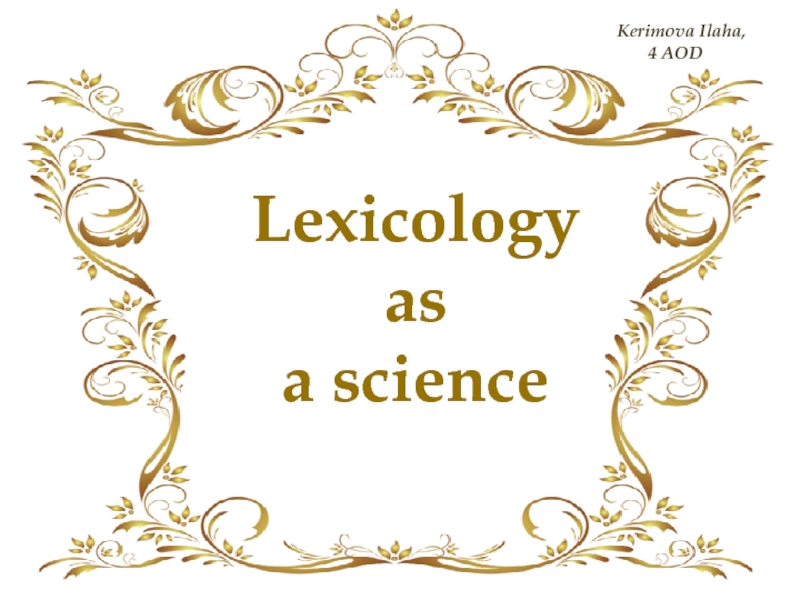
Слайд 2What is Lexicology?
Lexicology(from Gr.: lexis ‘word’ + logos ‘learning’) is a branch of linguistics,
is the study of words.
Lexicology as a branch of
linguistics has its own aims and methods of scientific research. Its basic task – being a study and systematic description of vocabulary in respect to its origin, development and its current use. Lexicology is concerned with words, variable word-groups, phraseological units and morphemes which make up words.
We do not know much about the origin of language and, consequently, of the origin of words.
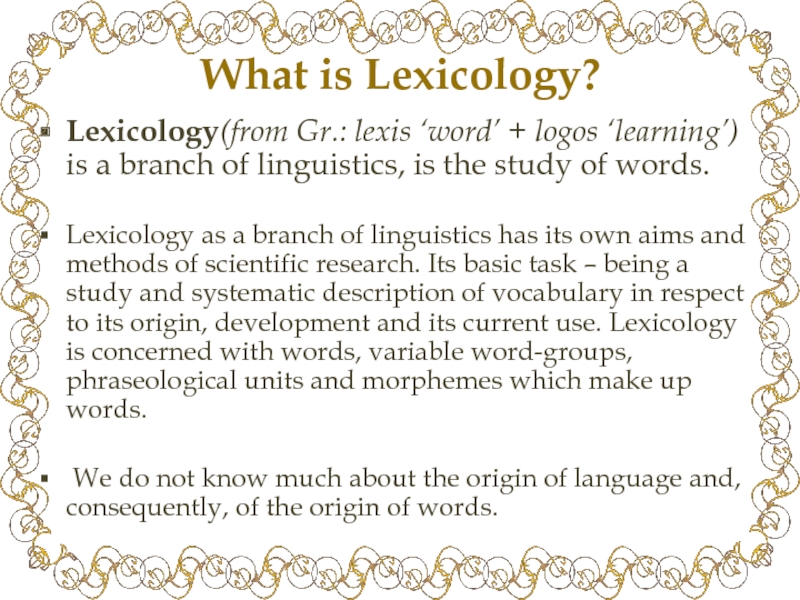
Слайд 3What is a word?
Some of the things we do know
about the nature of the word:
1) the word is
a unit of speech which, as such, serves the purposes of human communication. Thus, the word can be defined as a unit of communication.
2) the word can be perceived as the total of the sounds which comprise it.
3) the word, viewed structurally, possesses several characteristics.
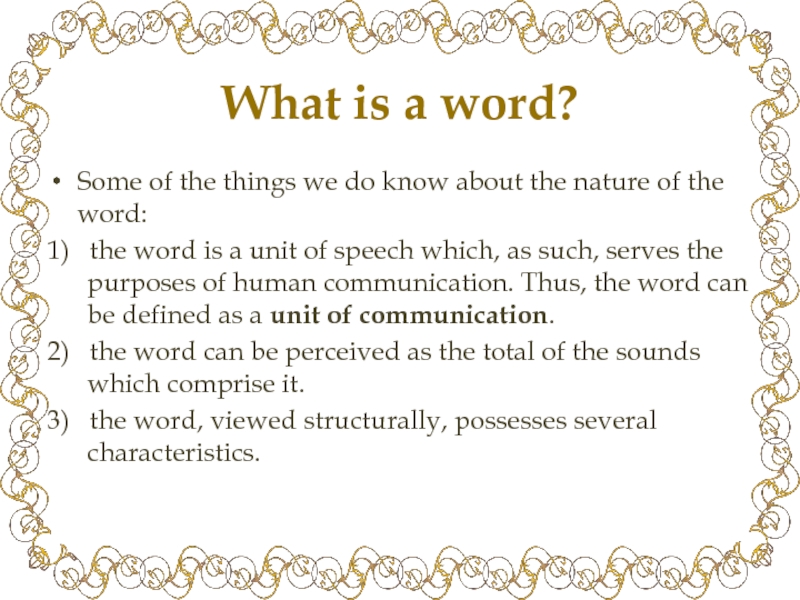
Слайд 4The structural aspects of the word.
The modern
approach to word studies is based on distinguishing between the
external and the internal structures of the word.
By external structure of the word we mean its morphological structure.
Ex.:in the word post-impressionists the following morphemes can be distinguished:
the prefixes :post-, im-,
the root : press,
the noun-forming suffixes : -ion, -ist,
the grammatical suffix of plurality :-s.
All these morphemes constitute the external structure of the word post-impressionists.
By internal structure of the word we mean the word’s semantic structure(meaning of the word).
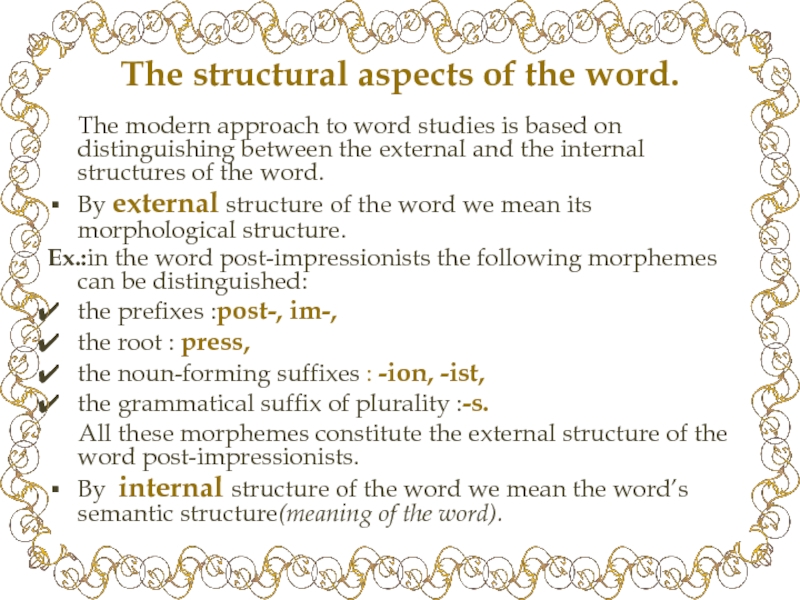
Слайд 5Unity of the word.
The word possesses both external (or formal)
unity and semantic
unity.
The formal unity of the word can best
be illustrated by comparing
a word and a word-group comprising identical constituents.
Ex.: the difference between a blackbird and a black bird is best explained by their relationship with the grammatical system of the language. The word blackbird, which is characterised by unity, possesses a single grammatical framing: blackbird/s. The first constituent black is not subject to any grammatical changes.
In the word-group a black bird each constituent can acquire
grammatical forms of its own: the blackest birds I’ve ever seen. Other
words can be inserted between the components which is impossible so
far as the word is concerned as it would violate its unity:
a black night bird.
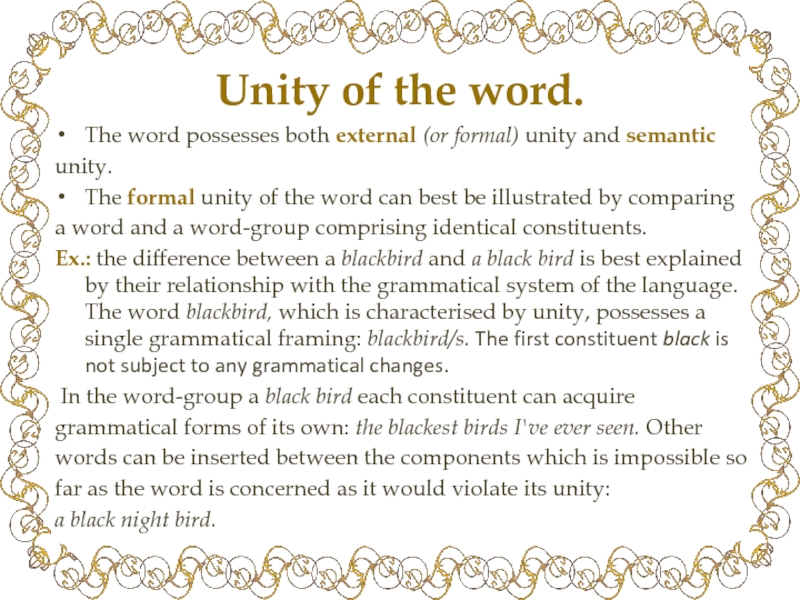
Слайд 6Semantic unity
The same example may be used to illustrate
what we
mean by semantic unity.
Ex.: In the word-group a black
bird each of the meaningful
words conveys a separate concept: bird — a kind of living
creature; black — a colour.
The word blackbird conveys only one concept: the type of bird.
All that we have said about the word can be summed up as
follows. The word is a speech unit used for the purposes of human
communication, materially representing a group of sounds,
possessing a meaning, susceptible to grammatical employment
and characterised by formal and semantic unity.
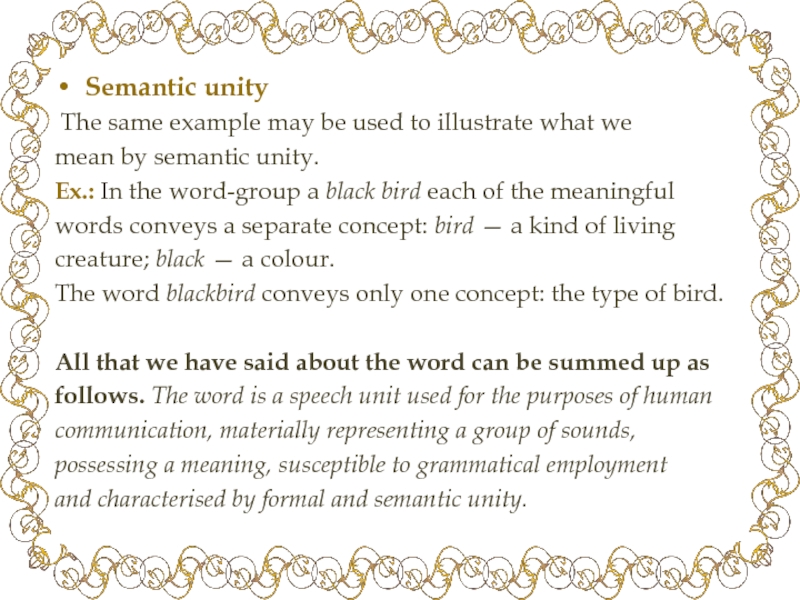
Слайд 7
The Main Lexicological Problems
The problem of word-building is associated with
prevailing
morphological word-structures and with processes of making new
words. Semantics is
the study of meaning. Modern approaches to this
problem are characterised by two different levels of study:
syntagmatic and paradigmatic.
On the syntagmatic level, the semantic structure of the word is
analysed in its linear relationships with neighbouring words in
connected speech. In other words, the semantic characteristics of the
word are observed, described and studied on the basis of its typical
contexts.
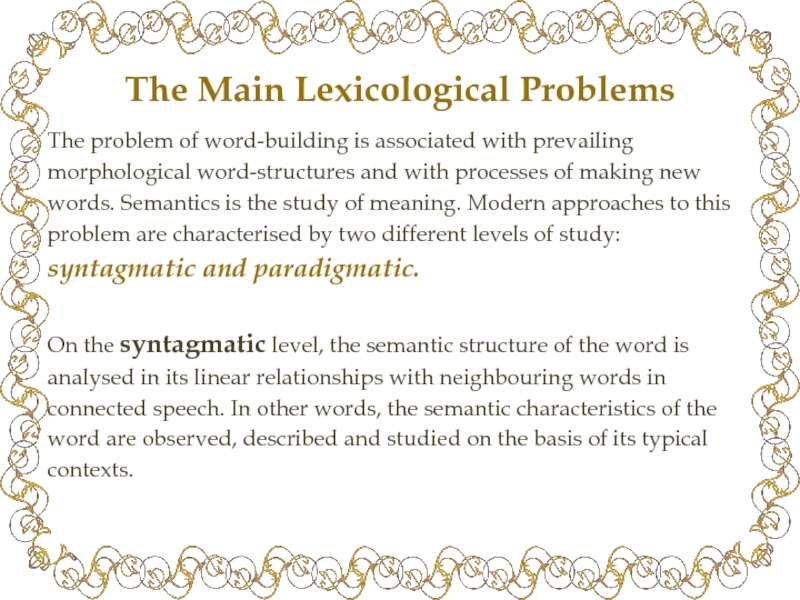
Слайд 8On the paradigmatic level, the word is studied in its
relationships
with other words in the vocabulary system. So, a word
may be studied
in comparison with other words.
of similar meaning.
Ex.: work, n. — labour, n.; to refuse, v. — to reject v. — to decline, v.,
of opposite meaning
Ex.: busy, adj. — idle, adj.; to accept, v, — to reject, v.,
of different stylistic characteristics
Ex.: man, n. — chap, n. — bloke, n. — guy, n.
The main problems of paradigmatic studies are :
synonymy
antonymy
functional styles
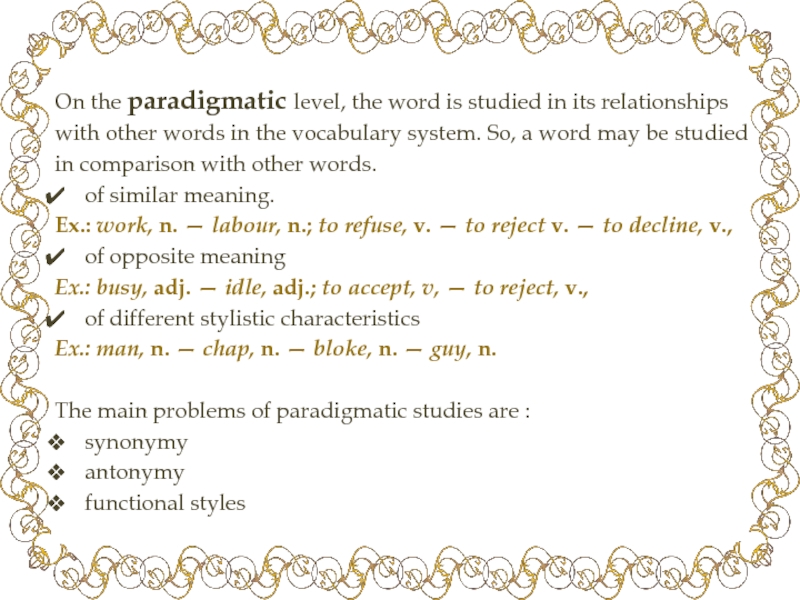
Слайд 9Phraseology.
Phraseology is the branch of lexicology specialising in word-groups which
are characterised by stability of structure and transferred meaning.
Ex.: to
take the bull by the horns, to see red, birds of a feather.
One further important objective of lexicological studies is the study of the vocabulary of a language as a system. The vocabulary can be studied synchronically, that is, at a given stage of its development, or diachronically, that is, in the context of the processes through which it grew, developed and acquired its modern form.
The opposition of the two approaches accepted in modern linguistics is nevertheless disputable as the vocabulary, as well as the word which is its fundamental unit, is not only what it is now, at this particular stage of the language’s development, but, also, what it was centuries ago and has been throughout its history.
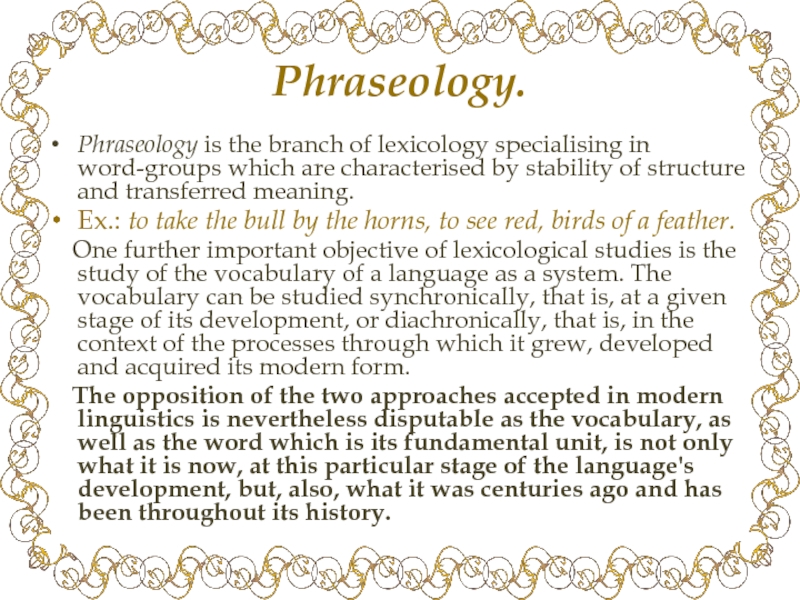
Слайд 10
Exercise
Consider your answers to the following.
1.What are the structural aspects
of the word?
2.What is understood by formal unity of a
word?
3.Explain why the word blackboard can be considered a unity and
why the combination of words a black board doesn’t possess such
a unity.
4.What is understood by the semantic unity of a word? Which of
the following possesses semantic unity — a bluebell (R.
колокольчик) or a blue bell (R. синий бубенчик).
5.Give a brief account of the main characteristics of a word.
6.What are the main problems of lexicology?
7.What are the main differences between studying words
syntagmatically and paradigmatically?
